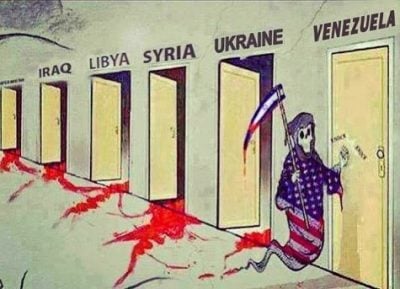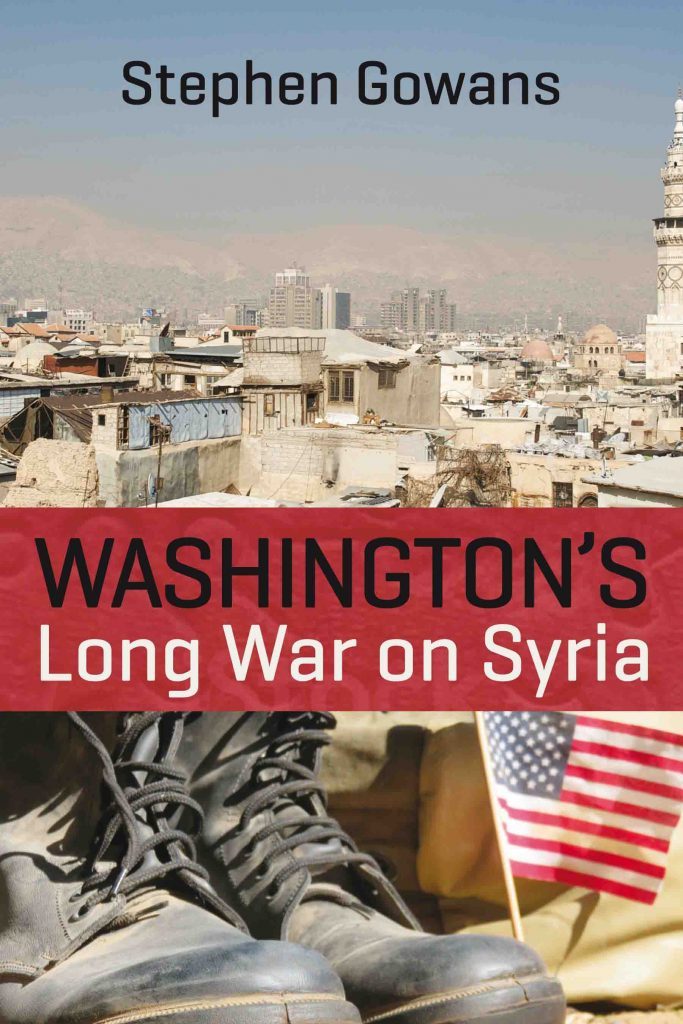The War on Syria: Exposing Media Distortions
Book review: Washington’s Long War on Syria, by Stephen Gowans

The war in Syria, mainstream media tell us, is a simple story, with a brutal dictator on one side and freedom-loving rebels on the other. Into this mix, the Islamic State has inserted itself, while the benevolent United States must intervene to rescue the Syrian people. U.S. involvement in Syria, motivated by altruism, the story goes, arose in direct response to events in 2011.
This view is as fanciful as it is notable for its myopic self-regard.
In Washington’s Long War on Syria, Stephen Gowans dismantles the official story, myth by myth, and provides the context without which it would be impossible to understand events.
Gowans relates the history of armed Islamist opposition to the secular government, reaching back decades. U.S. meddling in Syrian affairs also has a long history, as the author thoroughly covers.
Gowans quotes U.S. government documents that reveal a growing consensus on the desire to topple the Syrian government, which officials regarded as an impediment “to the achievement of U.S. goals in the region,” which included the spread of free market economies. The George W. Bush administration imposed a series of sanctions on Syria, which crippled the economy and wrought widespread suffering. “Sanctions of mass destruction” were visited on Syria “with grim humanitarian consequences,” Gowans writes.
By 2006, the U.S. began meeting with and providing support to Islamist groups, such as the Muslim Brotherhood-led National Salvation Front. Islamic extremists received funding to establish a satellite television station to broadcast anti-government programs into Syria. Millions of dollars were funneled to Islamist anti-government forces. Direct action was also mulled, and Bush Administration officials seriously considered the option of invading Syria.
The 2011 uprising in Syria is portrayed in mainstream media as entirely peaceful and dedicated to democratic ideals. Quoting from Western sources, Gowans shows that opposition groups in Daraa attacked police and burned down government buildings. In the weeks following the violence in Daraa, demonstrations throughout Syria typically numbered in the hundreds, far below levels seen elsewhere in the Arab world at that time. Contrary to Washington’s claims, protests in Syria tended to be led by the Muslim Brotherhood. The opposition quickly took up arms, and in a matter of months, had progressed from burning down buildings to waging armed guerrilla warfare.
Sensing opportunity in the armed uprising, Washington painted a very different picture of events so as to win public support for intervention. “When it became evident that the most prominent of the armed rebel groups were dyed-in-the-wool, head-chopping jihadists…U.S. propagandists created the concept of the ‘moderate’ rebel to assuage concerns that Washington was backing al-Qaeda and its clones,” Gowans reports.
Until its collapse, the opposition Syrian National Council was dominated by the Muslim Brotherhood and received $40 million a month from Saudi Arabia, Qatar, Kuwait, and the United Arab Emirates. Gowans observes: “Weren’t all these states presided over by princes, emirs, and kings, who preferred to govern by decree, eschewing any form of democratic input? What a curious set of allies for a so-called pro-democracy movement.”
The Free Syrian Army (FSA), much touted in the West, is hardly the moderate force of popular imagination, and Gowans thoroughly debunks such claims, showing how the FSA collaborates so closely with Al-Nusra that the two organizations share arms and ammunition and often fight side-by-side, in coordination with each other. CIA arms sent to the FSA can be expected to find their way to Al-Nusra.
In one of the book’s many examples demonstrating the ideology of the Free Syrian Army, the words of an FSA commander are referenced. “Those whose intentions are not for God had better stay home, whereas if your intention is for God, then you go for jihad and you gain an afterlife and heaven.” Gowans drily comments: “This was hardly the exhortation of a secularist.”
And who are the moderates of whom we hear so much? Gowans refers to the words of former director of national intelligence James Clapper: “Moderate these days is increasingly becoming anyone who’s not affiliated with Islamic State.” Gowans points out that “as far as Washington is concerned, every non-Islamic State armed group was moderate, including Al-Nusra, even though the al-Qaeda affiliate had been designated a terrorist organization by the United States itself.” In page after page, and with devastating logic, Gowans thoroughly demonstrates the absurdity of Washington’s claims to be aiding moderate forces.
Gowans demolishes the U.S. argument that its intervention in Syria is motivated by humanitarian concerns by contrasting it with U.S. silence on Saudi Arabia’s intervention in Bahrain to violently crush opposition. While Washington’s aid to Islamist rebels in Syria approached $1 billion a year, military and political support to Bahrain and Saudi Arabia continued unabated. Nor has Saudi intervention in Yemen proven an impediment to U.S. largesse. Recently, the Trump administration signed an agreement to provide Saudi Arabia with a staggering $110 billion in arms. The deal also called for as much as $350 billion to be added over the next decade.
“The Arab Spring had two components: its reality and its rhetoric,” Gowans explains.
“The Arab Gulf monarchies embraced the discourse of the Arab Spring in Libya and Syria, but crushed its reality at home. The monarchs’ patrons, officials of the United States, and the broader Western world, did the same.”
Washington’s Long War on Syria is a well-researched and deeply considered analysis of the tragedy that has befallen Syria. Stephen Gowans reveals the political and economic interests that are motivating Washington’s intervention in Syria. No praise is too high for this much-needed corrective to Western propaganda. This fascinating book is a must-read for anyone seeking a deeper understanding of the war in Syria.
To order:
 Washington’s Long War on Syria
Washington’s Long War on Syria
Gregory Elich is on the Board of Directors of the Jasenovac Research Institute and the Advisory Board of the Korea Policy Institute.
He is a member of the Solidarity Committee for Democracy and Peace in Korea, a columnist for Voice of the People, and one of the co-authors of Killing Democracy: CIA and Pentagon Operations in the Post-Soviet Period, published in the Russian language.
He is also a member of the Task Force to Stop THAAD in Korea and Militarism in Asia and the Pacific.
His website is https://gregoryelich.org
Follow him on Twitter at @GregoryElich

